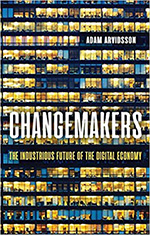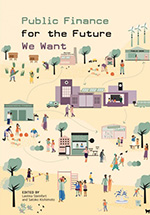We are gearing up for colder weather here in the northern hemisphere. Fall offers a great opportunity to cozy up with a good book. Here’s our quarterly list of books on our radar. We are always on the lookout for the latest and greatest sharing-related books and we love sharing what we are reading each quarter. As always, these books are either new, or new to us and if you notice anything we’ve missed, let us know at info@shareable.net. Happy reading!
Below are summaries, excerpted from each book’s website:
Free, Fair, and Alive: The Insurgent Power of the Commons by David Bollier & Silke Helfrich
“From co-housing and agroecology to fisheries and open-source everything, people are increasingly using “commoning” to emancipate themselves from a predatory market-state system. Free, Fair, and Alive presents a foundational re-thinking of the commons — the self-organized social system that humans have used for millennia to meet their needs. It offers a compelling vision of a future beyond the dead-end binary of capitalism versus socialism that has almost brought the world to its knees.
Written by two leading commons activists of our time, this guide is a penetrating cultural critique, table-pounding political treatise, and practical playbook…
Free, Fair, and Alive provides a fresh, non-academic synthesis of contemporary commons written for a popular, activist-minded audience. It presents a compelling narrative: that we can be free and creative people, govern ourselves through fair and accountable institutions, and experience the aliveness of authentic human presence.”
Changemakers: The Industrious Future of the Digital Economy by Adam Arvidsson
Publication date: November 11, 2019
“This book argues that, as industrial capitalism enters a period of prolonged crisis, a new paradigm of ‘industrious modernity’ is emerging. Based on small-scale, commons-based and market-oriented entrepreneurship, this industrious modernity is being pioneered by the many outcasts that no longer find a place within a crumbling industrial modernity.
This new industriousness draws on the new planetary commons that have been generated by the globalization of industrial capitalism itself. The outsourcing of material production to global supply chains has made the skills necessary to engage in commodity production generic and common, and the globalization of media culture and the internet have generated new knowledge commons. Together these new commons have radically reduced the capital requirements to engage in economic activity, and are providing new, highly efficient tools of productive organization at little cost.
This timely analysis of the new forces of change in our societies today will be of great interest to anyone concerned with the impact of digital technologies and the future of capitalism.”
 Governing the Wind Energy Commons: Renewable Energy and Community Development by Keith Taylor
Governing the Wind Energy Commons: Renewable Energy and Community Development by Keith Taylor
“Wind energy is often framed as a factor in rural economic development, an element of the emerging ‘green economy’ destined to upset the dominant greenhouse- gas-emitting energy industry and deliver conscious capitalism to host communities. The bulk of wind energy firms, however, are subsidiaries of the same fossil fuel companies that wrought havoc in shale-gas and coal-mining towns from rural Appalachia to the Great Plains. On its own, wind energy development does not automatically translate into community development.
In Governing the Wind Energy Commons, Keith Taylor asks whether revenue generated by wind power can be put to community well-being rather than corporate profit. He looks to the promising example of rural electric cooperatives, owned and governed by the 42 million Americans they serve, which generate $40 billion in annual revenue. Through case studies of a North Dakota wind energy cooperative and an investor-owned wind farm in Illinois, Taylor examines how regulatory and social forces are shaping this emerging energy sector. He draws on interviews with local residents to assess strategies for tipping the balance of power away from absentee-owned utilities.”
The Community Food Forest Handbook: How to Plan, Organize, and Nurture Edible Gathering Places by Catherine Bukowski and John Munsell
“Fueled by the popularity of permaculture and agroecology, community food forests are capturing the imaginations of people in neighborhoods, towns, and cities across the United States. Along with community gardens and farmers markets, community food forests are an avenue toward creating access to nutritious food and promoting environmental sustainability where we live. Interest in installing them in public spaces is on the rise. People are the most vital component of community food forests, but while we know more than ever about how to design food forests, the ways in which to best organize and lead groups of people involved with these projects has received relatively little attention.
In The Community Food Forest Handbook, Catherine Bukowski and John Munsell dive into the civic aspects of community food forests, drawing on observations, group meetings, and interviews at over 20 projects across the country and their own experience creating and managing a food forest. They combine the stories and strategies gathered during their research with concepts of community development and project management to outline steps for creating lasting public food forests that positively impact communities.”
Switching off the autopilot: An evolutionary toolbox for the Great Transition by Michael Narberhaus
“This book is about the ecological crisis that threatens to collapse our entire civilisation. It is about the crisis of liberal democracy unfolding before our eyes. And it is about a new approach that aims to tackle both crises…
The book argues that civil society leaders and funders have a lot to gain from adopting an evolutionary worldview. Evolutionary science teaches us how we got to where we are now, and how understanding our gene-culture co-evolutionary heritage will make it much easier to switch off our destructive deep-seated tendency for tribalism and design a good society. We have to shift all our attention to tackling the hard problem of evolution: figuring out how to adapt to the new conditions on Earth much faster than humanity has ever done or has had to do.”
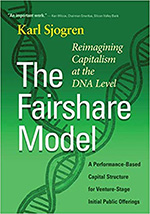 The Fairshare Model: A Performance-Based Capital Structure for Venture-Stage Initial Public Offerings—Reimagining Capitalism at the DNA Level by Karl Sjogren
The Fairshare Model: A Performance-Based Capital Structure for Venture-Stage Initial Public Offerings—Reimagining Capitalism at the DNA Level by Karl Sjogren
“The Fairshare Model is an idea for a performance-based capital structure that redefines capitalism at the DNA level, where ownership interests are set. When used to raise venture capital via an IPO, it balances and aligns the interests of investors and employees—capital and labor.
Author Karl Sjogren utilizes highly approachable language, humor, and analogies, along with insights about capital markets. The result is an eclectic, yet inviting discussion that might occur in a graduate-level symposium on economics, finance and philosophy.
This groundbreaking book focuses on startup valuations—microeconomics. But it also considers the macroeconomic implications of the Fairshare Model for economic growth, income inequality, and shared stakeholding, as well as game theory and financing of blockchain projects.”
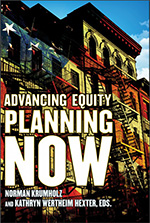 Advancing Equity Planning Now edited by Norman Krumholz and Kathryn Wertheim Hexter
Advancing Equity Planning Now edited by Norman Krumholz and Kathryn Wertheim Hexter
“What can planners do to restore equity to their craft? Drawing upon the perspectives of a diverse group of planning experts, Advancing Equity Planning Now places the concepts of fairness and equal access squarely in the center of planning research and practice. Editors Norman Krumholz and Kathryn Wertheim Hexter provide essential resources for city leaders and planners, as well as for students and others, interested in shaping the built environment for a more just world.
Advancing Equity Planning Now remind us that equity has always been an integral consideration in the planning profession. The historic roots of that ethical commitment go back more than a century. Yet a trend of growing inequality in America, as well as other recent socio-economic changes that divide the wealthiest from the middle and working classes, challenge the notion that a rising economic tide lifts all boats. When planning becomes mere place-making for elites, urban and regional planners need to return to the fundamentals of their profession. Although they have not always done so, planners are well-positioned to advocate for greater equity in public policies that address the multiple objectives of urban planning including housing, transportation, economic development, and the removal of noxious land uses in neighborhoods.”
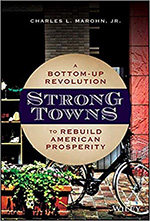 Strong Towns: A Bottom-Up Revolution to Rebuild American Prosperity by Charles L. Marohn, Jr.
Strong Towns: A Bottom-Up Revolution to Rebuild American Prosperity by Charles L. Marohn, Jr.
“Strong Towns: A Bottom-Up Revolution to Build American Prosperity is a book of forward-thinking ideas that breaks with modern wisdom to present a new vision of urban development in the United States. Presenting the foundational ideas of the Strong Towns movement he co-founded, Charles Marohn explains why cities of all sizes continue to struggle to meet their basic needs, and reveals the new paradigm that can solve this longstanding problem.
Inside, you’ll learn why inducing growth and development has been the conventional response to urban financial struggles—and why it just doesn’t work. New development and high-risk investing don’t generate enough wealth to support itself, and cities continue to struggle. Read this book to find out how cities large and small can focus on bottom-up investments to minimize risk and maximize their ability to strengthen the community financially and improve citizens’ quality of life.”
The Making of a Democratic Economy by Marjorie Kelly and Ted Howard
“From Ted Howard, co-founder of the Democracy Collaborative, and Marjorie Kelly, author of The Divine Right of Capital, and Owning our Future, The Making of a Democratic Economy is a clarion call for a movement ready to get serious about transforming our economic system. Illuminating the principles of a democratic economy through the stories of on-the-ground community wealth builders and their unlikely accomplices in the halls of institutional power, this book is a must read for everyone concerned with how we win the fight for an economy that’s equitable, not extractive.”
Public Finance for the Future We Want edited by Lavinia Steinfort and Satoko Kishimoto
“What if we used public money to build the systemic solutions needed for everyone to thrive? What if our money, tax and finance systems could be radically transformed? What if we could unlock the power of public finance by deepening democracy?
After the 2008 global financial crisis, big banks were rescued and public spending was curtailed. This justified ever harsher austerity measures and reinforced a persistent myth that the public sector must rely on private finance to solve excessive inequality and ecological destruction.
Today, private finance has not only failed to address these problems, it has intensified them. The public does not have to rely on the private sector. Public funds are much bigger than we imagine: equivalent to 93 per cent of global GDP. Public banks have enough resources to raise the many trillions needed to invest in public services and climate infrastructure, without having to turn to private financiers.
This book presents visions of regenerative and redistributive economies, built with collective power: from the thriving cooperative economy in Kerala, India, to the hundreds of local saving banks in Germany, the worker-owned bank Banco Popular in Costa Rica, and the thousands of People’s Credit Funds in Vietnam. It explores models that could become the new normal— the basis for a democratically organised and life-sustaining future.”
The Palgrave International Handbook of Basic Income edited by Malcolm Torry
This book “offers a comprehensive discussion of all the important aspects of the Basic Income debate for academics, policymakers and interested individuals.” It “compares Pilot Projects and Basic Income experiments across the world, addressing case studies from Canada and the USA, Brazil, Iran, Namibia, India, Switzerland, Finland and The Netherlands.” And it “assesses the differing effects of Basic Income schemes and Basic Income in 5 key areas: employment market effects, social effects, economic effects, ecological effects and gender effects.”
##
Take a look at our recommended reading from winter 2019, spring 2019 and summer 2019.



